- Home
- J. M. Hayes
Server Down
Server Down Read online
Server Down
Server Down
J.M. Hayes
www.jmhayes-author.com
Poisoned Pen Press
Copyright © 2009 by J.M. Hayes
First U.S. Edition 2009
Library of Congress Catalog Card Number: 2008937733
ISBN: 978-1-59058-627-3 Hardcover
ISBN: 978-1-61595-091-1 Epub
All rights reserved. No part of this publication may be reproduced, stored in, or introduced into a retrieval system, or transmitted in any form, or by any means (electronic, mechanical, photocopying, recording, or otherwise) without the prior written permission of both the copyright owner and the publisher of this book.
Poisoned Pen Press
6962 E. First Ave., Ste. 103
Scottsdale, AZ 85251
www.poisonedpenpress.com
[email protected]
Epigraph
I believe that the flag
It was more than a rag
But the outlaws in office
Have shattered my life.
—John Stewart (1939–2008)
“Survivors”
Author’s Note
Buffalo Springs and Benteen County, Kansas are fictitious. Tucson, though it should be, is not. In the same vein, the Sewa tribe, its police force, and reservation are inventions. Pascua Yaqui Village is real, as is its habit of sharing the intimacies of ancient ceremonies with people willing to view them with respect.
Contents
Epigraph
Author’s Note
Server Down
Afterword/Acknowledgment
More from this Author
Contact Us
Server Down
The echo of drums and softly chanting voices didn’t help Pascua resemble an Indian village. It was a drab cluster of municipal buildings surrounded by a mixed neighborhood—nice-but-modest homes and industrial-urban blight. Still, a five-hundred-year-old ceremony was taking place there. That made it beautiful, and worth the thousand mile drive.
Mad Dog parked his Mini Cooper across the street. He looked at his watch and smiled. Midnight. The drive had taken a bit less than sixteen hours and gotten him no speeding tickets.
Hailey stuck her muzzle in his ear and whined. The massive wolf-hybrid had been a surprisingly docile passenger. Now, she wanted out. He leaned over and opened the passenger door and she launched herself into the dusty lot beside his parking space.
He opened his own door and stepped onto broken asphalt through which a few weeds protruded. He stretched muscles, cramped from occupying too small a space for too many hours, then walked around to the back of the car. He opened the hatch, and pulled out Hailey’s bowl and a jug of water. He put most of the jug in her bowl, then drained the last himself. Neither of them had drunk much today. He’d wanted to avoid pit stops and make good time and Hailey had seemed to understand. She’d curled up on the back seat and slept most of the way. Until he pulled up here, a few blocks east of I-10 in Tucson, she hadn’t complained. She’d just taken advantage of the stops he’d made and never once gone off exploring. Now, silver coat gleaming in the reflection of a bright moon and distant street lamps, she bounded back and helped herself to a generous drink. By the time Mad Dog put the jug back in the Mini, she’d disappeared.
The air was warm, at least compared with where he’d come from. And heavy with the perfume of blooming things. Citrus, maybe. The thermometer had still been under thirty degrees when he left home that morning. It must be at least seventy here, even if it wasn’t yet April.
Hailey didn’t reappear, so he locked the hatch and put her water bowl by the passenger door. He left the window on her side down in case she wanted back in. Most people would have been concerned if their pet jumped out of a car a thousand miles from home and promptly vanished. Mad Dog wasn’t. Hailey was no pet. She was much more and she could take care of herself anywhere.
Mad Dog left his jacket behind. He even rolled up his sleeves as he crossed the narrow street and slipped beneath scraggly trees, their branches dancing to a wind he had expected to leave on the Great Plains. It wasn’t much of a breeze by Kansas standards. Back there, it sometimes seemed no more than a dozen trees and a handful of fence posts slowed its passage back and forth between the Gulf and the Arctic Ocean. Here, there were mountains. Even now, inside the city, he could make out the jagged bite they took out of the night sky.
He headed toward the sounds and the lights. Low voices. Chanting. Drums. Rattles. He stepped through a gate and into a different world.
Ahead of him was a church, open at the front, and facing a plaza. A host of crosses and dark-skinned people filled the space. Dim electric lights failed to match the illumination from roaring fires. Two processions, one of men, one of women, approached a cross. Around that cross, a horde of demons fought a confused battle. White-faced creatures with great ears and short horns battled beasts in Halloween-like masks. They all wore belts of rattles that made more noise than the cap guns they fired at each other. They cut and thrust and parried with wooden swords and daggers, too. It was wonderful. It was everything Mad Dog had hoped for. Everything his niece, Heather, had promised.
“Wow,” Mad Dog whispered.
Someone grabbed his arm and swung him around. “Brujo,” the man hissed. “Why are you here?”
“My name’s not Brujo,” Mad Dog said. “And take your hand off me.”
“You cannot bring your evil to this holy place.”
“What evil?” Mad Dog took the man’s thumb and bent it back.
The stranger, a compact, dark-skinned man with long braided hair and a beaded head band, lost his grip, but he hissed that name again, “Brujo!” and swung at Mad Dog’s face with his other hand. Mad Dog slipped the blow but the man got hold of Mad Dog’s medicine pouch and tore it from his throat. There were precious things in there—ochre from the Cheyenne sacred mountain, a strand of hair from the girl who loved him, a tiny diamond his mother had worn in one of her ears.
Hailey was suddenly there, her mouth on the man’s hand. Just holding it, so far, as she growled her threat to make further use of sharp teeth.
“What’s going on here?” Another man joined them in the shadows by the gate. This one also had dark skin and high cheek bones, though his military-style short black hair was sprinkled with silver. He was in uniform and he kept one hand on the butt of his service revolver.
“This man attacked me.”
It took Mad Dog a moment to realize that the right explanation had been offered, but by the wrong person.
“He tried to steal my medicine pouch and his dog bit me.”
Mad Dog shook his head. “That’s not true. It was the other way around. He’s got my pouch right there in his hand.”
“Just look at him,” Mad Dog’s accuser said. “You think some gringo is going to own a medicine pouch?”
“I’m Cheyenne,” Mad Dog said. The cop seemed doubtful. Mad Dog knew he looked about as white as possible. He was big and broad and bald—bald because, when he’d tried to grow hair long enough for braids, it had come in with the kind of curls some women paid small fortunes to achieve. And light brown, or at least it used to be. It was more likely gray by now. He couldn’t tell for sure because he shaved his head at least once every day.
“I think you better take your dog and go,” the cop said. “Dogs aren’t allowed.”
“What dog?” Mad Dog said. Hailey had done another disappearing act. The moment the cop arrived, she’d faded into the night.
“I can tell you what’s in that medicine pouch,” Mad Dog added. “This guy can’t because it’s not his.”
“Not true,” the man with the braids said. “But it can’t be opened. It’s sacred. A holy thing. Open it and you’ll ruin it.”<
br />
The cop put out his hand. “Give it to me. Then both of you follow me. We’re going to step out in the street, under that lamp over there where we have some light so I can figure out what to do with you.”
“But…” Mad Dog began.
“We’re going to stop creating a disturbance, gentlemen. This is a sacred ceremony.” He put a hand on both their arms and escorted them through the exit.
“I just drove a thousand miles to see this,” Mad Dog protested.
“Good for you. And maybe you can still watch it after we….”
The officer stopped, a surprised look on his face as he glanced down at the knife handle that suddenly protruded from his chest. He gurgled and stumbled and fell, and the man who’d stabbed him, the man with the braids, began shouting something in a language Mad Dog didn’t understand. From the way some nearby men began looking at Mad Dog, he was pretty sure it was something like “Help me lynch this gringo because he just murdered a police officer.”
There were hundreds of people in the courtyard. No more than a dozen with skin as pale as his. Mad Dog wanted to stay and defend himself. But Hailey disagreed. She was beside him again, baring her teeth at several men who’d moved to block him. They stepped aside and she fled through the gap. Mad Dog followed her example.
***
Who are the guys with the swords and the cap guns?” Heather English asked.
“Those are Chapayekas,” Ms. Jardine said.
Heather was a small-town Kansas girl. Ms. Jardine had been, too, until she retired from teaching at Buffalo Springs Elementary School to start selling crystals in Tucson.
“And Chapayekas are…?” Heather asked.
“I hope I’ve got this right,” Ms. Jardine said. “I haven’t been to these ceremonies in years. If I remember, they’re playing the role of the Roman guards at Jesus’ tomb at the moment. The procession of women, they’re coming to discover that Jesus has risen.”
“This is amazing,” Heather said. Uncle Mad Dog had taken her to Pow-Wows back home, but never anything as elaborate and involved as this. She had tried to call Mad Dog to tell him about it. His phone was busy so she gave up and just emailed him. “It’s too bad I couldn’t let Uncle Mad Dog know about this early enough for him to have time to get here.”
“Mad Dog would love it,” Ms. Jardine said. “Hey, I love it. Thanks for giving me an excuse to share the Yaqui Easter ceremonies with someone. I didn’t realize how much I missed them.”
Ms. Jardine looked the part of an aficionado of Native American ceremonies. Her hair hung over her shoulders in braids that sparkled with the crystals woven into them. She wore a squaw dress and moccasins and was draped with Indian silver and turquoise. She made Heather feel underdressed in her jeans, white blouse, and blue blazer.
It was pure chance that Heather had been available to share the event. She was about to complete her law degree at the University of Kansas. One of her professors had learned that retired Supreme Court Justice Sandra Day O’Connor, who now taught at the University of Arizona, would host a two-day seminar for a select group of women law students from across the country in Tucson this week. Heather had applied and been accepted. Heather’s mother had been a teacher in Buffalo Springs, too. She and Ms. Jardine had been good friends. Acquaintances went without saying. Buffalo Springs was too small for them to have avoided knowing each other, but it had gone way beyond that. And Ms. Jardine had taught Heather. Though Heather’s mother had passed away several years ago, the relationship remained strong and Ms. Jardine had offered Heather a place to stay while she attended the seminar.
Heather was so impressed with these ceremonies that she’d immediately contacted her sister, an anthropology grad student at Texas Tech, and her uncle. Or tried, in the latter case. She’d never managed to connect with Mad Dog and her sister had been unable to get away.
“What Cheyenne shaman wouldn’t love this?” Heather wondered. Uncle Mad Dog really was Cheyenne. So was she. Her sister wasn’t. Her sister was adopted, though they were related on her mother’s side and looked enough alike to be twins. The bloodline was her father’s. Heather’s grandmother had claimed to be a Cheyenne half-breed. Genealogical research later showed that her Cheyenne half actually was made up of equal parts Sans Arc, Mexican Cowboy, Buffalo Soldier, and the Cheyenne she’d claimed. As for the shaman thing, well, Uncle Mad Dog occasionally seemed to know and do some pretty remarkable things. Some pretty weird ones, too.
The women were on the south side of the plaza, not far from the open mouth of the church. The structure had no east wall and, therefore, seemed more welcoming than most churches to Heather. Not that she’d gone inside. While these ceremonies took place, Ms. Jardine had explained they should stay out of the way and watch respectfully. And, most important, not take any pictures. The Yaquis welcomed visitors, but not photographs, tape recorders, or notebooks. What was happening here wasn’t a Kodak moment.
They watched the Yaqui women throw confetti over the figure of Christ.
“This goes on all night,” Ms. Jardine said. “But the climax is tomorrow, the day before Easter. The Gloria, they call it—a battle between good and evil.”
“Yeah?” Heather was glad she wasn’t flying home until Sunday.
“The evil Chapayekas line up and charge the church over and over until they’re killed by flowers and confetti. We can come back for that, but I’m afraid I’m not up for an all-nighter. I need my sleep or I’ll look older than time by morning.”
Ms. Jardine hardly showed her age. Her hair was gray and there were crinkles around her eyes, but that was it.
“I hate to miss anything,” Heather said, “but yeah, I’m dead on my feet.”
They threaded through the crowd, being careful not to get in the way of any of the participants. It took several minutes to make it to the plaza’s main entrance. It was blocked with yellow crime-scene tape. Mostly, anyway. The remaining space was occupied by a muscular Indian wearing a Sewa Indian Nation Police uniform. The flashing lights of an emergency vehicle lit the street behind him. EMTs crouched over another uniformed man lying on the ground just short of the curb.
“What’s going on?” Heather asked.
The man didn’t answer. “I need to see some IDs, ladies, before you can go.”
Ms. Jardine produced her driver’s license. Heather decided on a different approach.
The big man made a note of Jardine’s information, but he took a long time studying Heather’s.
“Kansas? You’re a long way from home, Deputy English.”
“Yes, I am.”
Benteen County’s Sheriff English, her father, had been injured in a wild shootout more than a year ago. He’d sworn his daughter in as a temporary deputy at the time. She’d been on the county’s books ever since because his recovery had gone more slowly than hoped. In the interim, the county had been so short-handed they even paid her to work whenever she’d been able to come home from school for a weekend. Just minimum wage, though. Still, she got a kick out of being able to flash her badge. People looked at a deputy differently than they did a twenty-three year-old law student.
“So, what happened—” she tried again.
The policeman wrote her name and Benteen County contact information on his sheet. He took his time, but he finally answered.
“Somebody knifed one of our officers,” he said as he handed her ID back. “We’re looking for a big bald guy. You notice anybody like that around here tonight?”
Heather exchanged glances with Ms. Jardine. Big bald guy fit the description of her Uncle Mad Dog. But Mad Dog was still back in Central Kansas as far as Heather knew.
“No,” Heather said. “We didn’t see anybody like that.”
The big cop nodded. “Okay. You can go. But if you remember anything that might be helpful, call us.”
The women nodded. They edged out the gate and past the spot where blankets were being held up to keep people like them from ogling the body.
“There’s a
name etched on the knife handle,” a voice said from behind the curtain. “Anybody know someone called Mad Dog?”
***
That you, Englishman?”
Sheriff English hated that nickname, though what could you expect once your brother started calling himself Mad Dog? The sheriff also thought it was a stupid question. His only remaining deputy, an incompetent bumbler who was most effective while at home and asleep, wouldn’t be crawling from behind the wheel of the Benteen County Sheriff’s Department’s black and white with a walker.
“Yeah, it’s me,” the sheriff said, arranging the contraption so he could get around without falling flat on his face.
The chief of the local volunteer fire department stepped out of the chill night and into the glow of the cruiser’s interior lights.
“We did what we could,” the man said, his breath fogging. “I think we’ll save the out buildings, but there weren’t nothing left of the house.”
All that remained of the structure was a series of small bonfires. The volunteers weren’t paying much attention to them because they were still working on the flames licking at the garage door.
Other bonfires, smaller ones, burned fitfully all over the yard, evidence that the house hadn’t just burned, it had exploded.
The sheriff’s mouth felt dry and his breath came harder than normal. “What about my…?”
“Don’t know. There’s no sign of your brother or that wolf of his. Of course we ain’t had a chance to sift through those ashes yet.”
“He would have been here, this time of night,” the sheriff said. Hell, in Benteen County, even on a Friday night, they rolled the sidewalks up at dusk. There was nowhere to go—no movies, no bowling alley. Hardly any bars, and Mad Dog didn’t drink. Not recreationally, anyway. “Any idea what happened?”
“Now, there we got lucky,” the chief said. “Billy Macklin stopped by soon after we got here. He said he was taking Dana Miller home, driving by Mad Dog’s place just at the moment the place blew.”

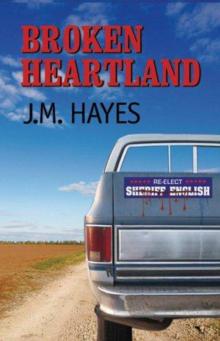 Broken Heartland
Broken Heartland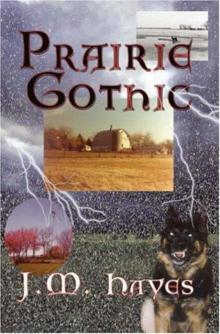 Prairie Gothic
Prairie Gothic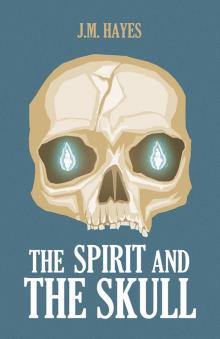 Spirit and the Skull
Spirit and the Skull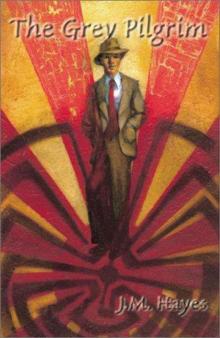 The Grey Pilgrim
The Grey Pilgrim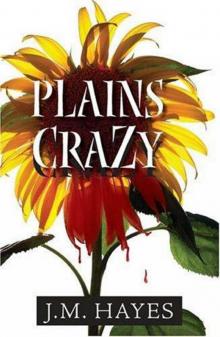 Plains Crazy
Plains Crazy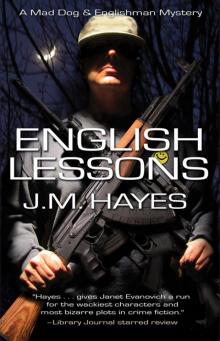 English Lessons
English Lessons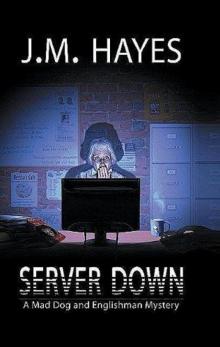 Server Down
Server Down